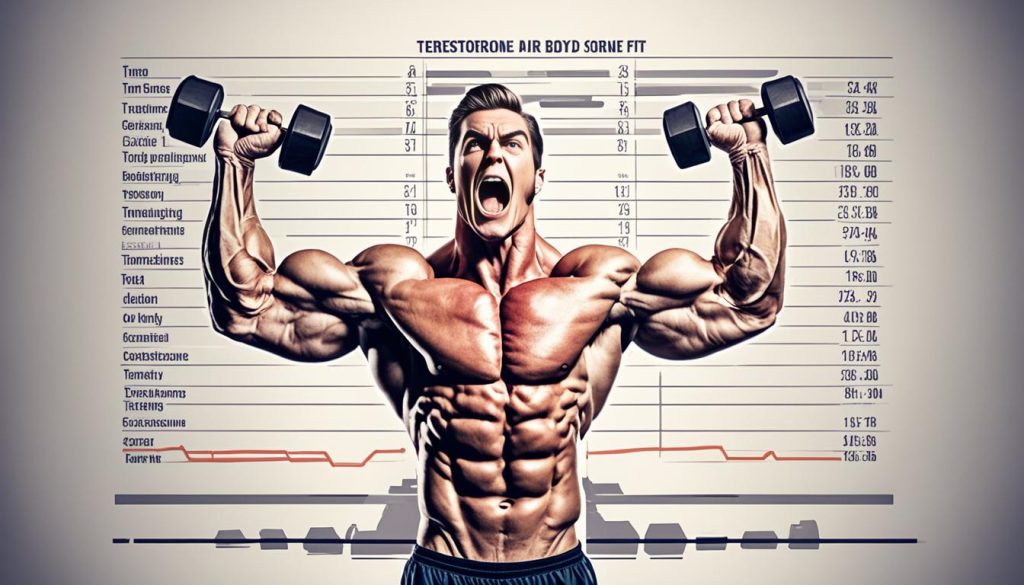Ad Blocker Detected
Our website is made possible by displaying online advertisements to our visitors. Please consider supporting us by disabling your ad blocker.
When you stop taking testosterone therapy, various physical and hormonal changes can occur in your body. These changes can lead to a range of effects, including hormone imbalance, low sex drive, muscle loss, and decreased libido. Understanding the potential side effects and managing the transition effectively is crucial to minimizing the impact on your overall well-being.
At first, it’s important to recognize that the effects of stopping testosterone can vary from individual to individual. Factors such as the length of time spent on testosterone therapy and personal characteristics can influence the duration and intensity of these changes.
Some common symptoms that may arise after discontinuing testosterone therapy include fatigue, low sex drive, erectile dysfunction, muscle loss, and cognitive deficits. These symptoms can persist for a period of time as your body adjusts to the absence of exogenous testosterone.
Key Takeaways:
- Stopping testosterone therapy can result in physical and hormonal changes in the body.
- These changes can lead to symptoms such as fatigue, low sex drive, muscle loss, and cognitive deficits.
- The duration and intensity of these effects can vary depending on individual factors and the length of time on testosterone therapy.
- Seeking medical guidance and support is important to manage the transition effectively and minimize the impact of these changes.
- It is essential to prioritize overall health and well-being while managing the effects of testosterone withdrawal.
The Impact on Natural Testosterone Production
Testosterone replacement therapy (TRT) is often used to increase testosterone levels in individuals with low testosterone. While TRT can provide various benefits, it can also have an impact on the body’s natural testosterone production.
When a person begins TRT, the exogenous testosterone they receive can cause their body to reduce or even stop its own testosterone production. This is because the body recognizes the presence of exogenous testosterone and signals the testes to decrease or halt natural testosterone production. In a way, TRT creates a dependency on external testosterone.
However, when TRT is discontinued suddenly, the body is left without the exogenous testosterone it has become dependent on, and its natural testosterone production may not immediately resume. This can lead to a temporary state of chemical imbalance, known as testosterone withdrawal.
Testosterone withdrawal can involve symptoms such as fatigue, decreased sex drive, and erectile dysfunction. These symptoms may occur as the body readjusts to producing testosterone on its own again. The duration and intensity of these symptoms can vary depending on several factors, including the length of time spent on TRT and the dosage used.
To effectively manage the impact on the body’s hormonal balance, it is crucial to seek medical supervision during and after discontinuing testosterone therapy. A healthcare professional can provide guidance and support to navigate the transition and address any chemical imbalances that may arise.
| Effects of Stopping TRT | Duration | Management |
|---|---|---|
| Fatigue | Temporary | Medical supervision, lifestyle modifications |
| Decreased sex drive | Temporary | Medical supervision, addressing chemical imbalance |
| Erectile dysfunction | Temporary | Medical supervision, addressing chemical imbalance |
Restarting the HPTA Axis
After discontinuing testosterone therapy, it is crucial to restart the Hypothalamic-Pituitary-Testicular Axis (HPTA) to stimulate the body’s natural testosterone production. Medical guidance is essential in determining the most appropriate approach to achieve this. The goal is to achieve a balance of hormones from the hypothalamus, pituitary glands, and testicles to optimize endogenous testosterone production.
One method of restarting the HPTA axis involves hormone stimulation, specifically through the use of luteinizing hormone (LH). LH is a key hormone that plays a vital role in testosterone production. By stimulating the Leydig cells in the testicles, LH promotes the synthesis and secretion of testosterone.
Another approach that may be recommended by medical professionals is the use of selective estrogen receptor modulators (SERMs). These medications work by blocking the effects of estrogen on the hypothalamus and pituitary glands, which can lead to an increase in luteinizing hormone (LH) secretion. By blocking estrogen’s negative feedback loop, SERMs can help increase the production of testosterone.
“Restarting the HPTA axis is essential to kickstart your body’s natural testosterone production. Medical guidance is crucial to determine the most effective strategy, whether it be through hormone stimulation or selective estrogen receptor modulators. By finding the right balance of hormones, you can resume optimal testosterone production and restore hormonal balance.”
With the guidance of a healthcare professional, the appropriate dosage and duration of using LH or SERMs can be determined. It is important to follow their advice closely to ensure safety and effectiveness.
| Method | Description |
|---|---|
| Luteinizing Hormone (LH) | Stimulates the Leydig cells to promote testosterone synthesis and secretion |
| Selective Estrogen Receptor Modulators (SERMs) | Blocks the effects of estrogen, increasing luteinizing hormone (LH) secretion and promoting testosterone production |

By restarting the HPTA axis under medical guidance, individuals can promote the production of testosterone and restore their hormonal balance. This step is essential in managing the effects of stopping testosterone therapy and optimizing overall well-being.
Making Lifestyle Changes
When it comes to managing the effects of stopping testosterone therapy, certain lifestyle modifications can play a crucial role. These changes not only support natural testosterone production but also contribute to overall well-being. By incorporating a balanced diet, regular exercise, stress management techniques, and sufficient sleep into your routine, you can optimize hormone production and promote a healthy lifestyle.
Although lifestyle changes alone may not completely resolve low testosterone issues, they can have a positive impact on hormone levels and support the body’s natural processes. Here are some key aspects to focus on:
- Diet: Include foods rich in healthy fats, such as avocados, nuts, and olive oil, as they are essential for hormone production. Additionally, incorporate a variety of fruits, vegetables, lean protein sources, and whole grains into your meals to support overall health.
- Exercise: Engage in regular physical activity, which has been shown to boost testosterone levels. Combining cardiovascular exercises, like jogging or swimming, with weight training can provide optimal results. Consult a fitness professional if you need help designing a workout routine that suits your needs.
- Stress management: Implement stress management techniques, such as meditation, deep breathing exercises, or engaging in hobbies, to reduce chronic stress levels. High levels of stress can negatively impact hormone production, so finding healthy ways to cope with stress is essential.
- Sleep: Prioritize sufficient sleep, aiming for 7-9 hours each night. Quality sleep plays a vital role in hormone regulation and overall well-being. Establish a regular sleep schedule and create a sleep-friendly environment to optimize your sleep quality.
By making these lifestyle changes, you can support your body’s natural hormone production and manage the effects of stopping testosterone therapy. Remember, it’s important to consult with a healthcare professional for personalized guidance and advice tailored to your specific situation.
Gradual Tapering and Medical Support
When it comes to discontinuing testosterone therapy, taking a gradual tapering approach can make all the difference in managing the process and minimizing any potential shock to your system. Gradual tapering involves slowly reducing your dosage over a period of several weeks or even longer if needed. This allows your body to adjust more smoothly to the changes in hormone levels, helping to alleviate withdrawal symptoms that may arise.
It’s crucial that you work closely with a medical professional during this transition. Seeking their guidance and support can ensure that you have the necessary medical supervision throughout the tapering process. They can help determine the most appropriate tapering schedule tailored to your specific needs and may even prescribe additional medications, if necessary, to help ease any discomfort or complications that may arise.
By following a gradual tapering plan under professional medical guidance, you can effectively manage the symptoms that may accompany discontinuing TRT. This approach allows your body to adapt more gradually and helps to minimize the impact of the hormonal changes that occur when transitioning off testosterone therapy.
Quote:
“Gradual tapering is a strategic approach to discontinuing testosterone therapy, allowing your body to adapt more smoothly and minimize any potential complications. Working with a medical professional throughout the process ensures that you receive the necessary guidance and support for a safe and successful transition.”
In addition to gradual tapering, it’s important to be proactive in managing your symptoms during this time. Be aware that you may experience some temporary changes in energy levels, mood swings, and even fluctuations in libido as your body adjusts to the withdrawal of testosterone. Taking measures such as maintaining a healthy lifestyle, including regular exercise, a balanced diet, stress management, and adequate sleep, can all contribute to managing these symptoms effectively.
By incorporating these lifestyle changes and working closely with your medical professional, you can navigate the process of discontinuing testosterone therapy with the support and guidance you need to minimize any disruptions to your overall well-being.
| Benefits of Gradual Tapering and Medical Support: | Benefits of Gradual Tapering and Medical Support: |
|---|---|
| Minimizes shock to the body’s system | Allows for smoother transition |
| Manages withdrawal symptoms | Promotes overall well-being |
| Reduces potential complications | Provides necessary medical supervision |

By prioritizing gradual tapering and seeking medical guidance, you can navigate the discontinuation of TRT in a way that minimizes the shock to your system and effectively manages any withdrawal symptoms that may arise. Remember that everyone’s experience is unique, and working closely with a medical professional is essential to ensure a smoother transition and maintain your overall health and well-being.
The Role of Exercise
Regular exercise offers numerous benefits for your overall health and well-being, including its positive impact on testosterone levels. By incorporating a combination of cardiovascular exercises and weight training into your routine, you can help maintain higher testosterone levels over time.
Cardiovascular exercises, such as running, swimming, or cycling, get your heart pumping and increase blood flow throughout your body. This increased blood flow stimulates the production of testosterone, promoting hormonal balance.
Weight training exercises, on the other hand, help build muscle mass and strength. Engaging in resistance training workouts, such as lifting weights or using resistance bands, stimulates the release of testosterone in your body.
While exercise alone might not fully alleviate low testosterone symptoms, it plays an integral role in supporting hormone production and improving overall health. By regularly incorporating both cardiovascular exercises and weight training into your fitness routine, you can optimize your hormone levels and maximize the benefits of exercise for your body.

Exercise Benefits for Testosterone Levels:
- Promotes the production of testosterone
- Increases blood flow and hormonal balance
- Stimulates muscle growth and strength
- Improves overall health and well-being
Incorporating exercise into your daily routine is an essential aspect of maintaining hormone balance and overall health. By committing to a regular exercise regimen that includes cardiovascular exercises and weight training, you can support your testosterone levels and positively impact your overall well-being.
Conclusion
Managing the effects of testosterone withdrawal and maintaining overall health after stopping testosterone therapy is crucial for a smooth transition. Seek medical guidance to navigate the changes in your body and minimize any potential long-term effects. Addressing the HPTA axis through hormone stimulation and medications can help restart natural testosterone production.
Making lifestyle changes such as adopting a balanced diet, incorporating regular exercise, managing stress, and getting sufficient sleep can support hormone production and improve overall well-being. Gradually tapering off testosterone therapy under medical supervision can help minimize the shock to your system and manage withdrawal symptoms effectively.
Remember, while stopping testosterone therapy can bring physical and hormonal changes, prioritizing your overall health and well-being is essential. By understanding the effects of stopping testosterone and taking proactive steps, you can navigate the transition and maintain a healthy lifestyle.
FAQ
What happens when you stop taking testosterone?
When you stop taking testosterone, it can lead to a range of physical and hormonal changes in the body. These changes can result in symptoms such as fatigue, low sex drive, erectile dysfunction, muscle loss, decreased libido, and cognitive deficits.
What are the effects of stopping testosterone?
The effects of stopping testosterone can include fatigue, low sex drive, erectile dysfunction, muscle loss, decreased libido, and cognitive deficits. The duration and intensity of these effects can vary depending on the length of time spent on testosterone therapy and individual factors.
What are the testosterone withdrawal symptoms?
Testosterone withdrawal symptoms can include fatigue, low sex drive, and erectile dysfunction. The duration of these symptoms can vary depending on factors such as the duration and dosage of testosterone therapy.
Are there long-term effects of stopping testosterone?
There can be long-term effects of stopping testosterone, including potential hormonal imbalances and changes in physical and mental well-being. It is important to seek medical guidance and support when discontinuing testosterone therapy to manage these potential long-term effects.
How does stopping testosterone therapy affect hormone balance?
Stopping testosterone therapy can disrupt hormone balance in the body, as it can suppress the body’s natural production of testosterone. It is crucial to seek medical supervision when discontinuing testosterone therapy to manage the impact on the body’s hormonal balance effectively.
What are the potential effects of abruptly stopping testosterone therapy?
Abruptly stopping testosterone therapy can lead to several unnecessary testosterone side effects. These may include mood swings, fatigue, and decreased muscle mass. It’s essential to consult with a healthcare professional before making any changes to hormone replacement therapy to minimize these potential effects.
What are the potential effects of stopping testosterone therapy?
Stopping testosterone therapy can lead to a range of side effects of testosterone therapy, such as fatigue, decreased muscle mass, low libido, mood swings, and osteoporosis. It’s important to consult with a healthcare professional before making any decisions about discontinuing testosterone therapy to minimize these potential effects.


